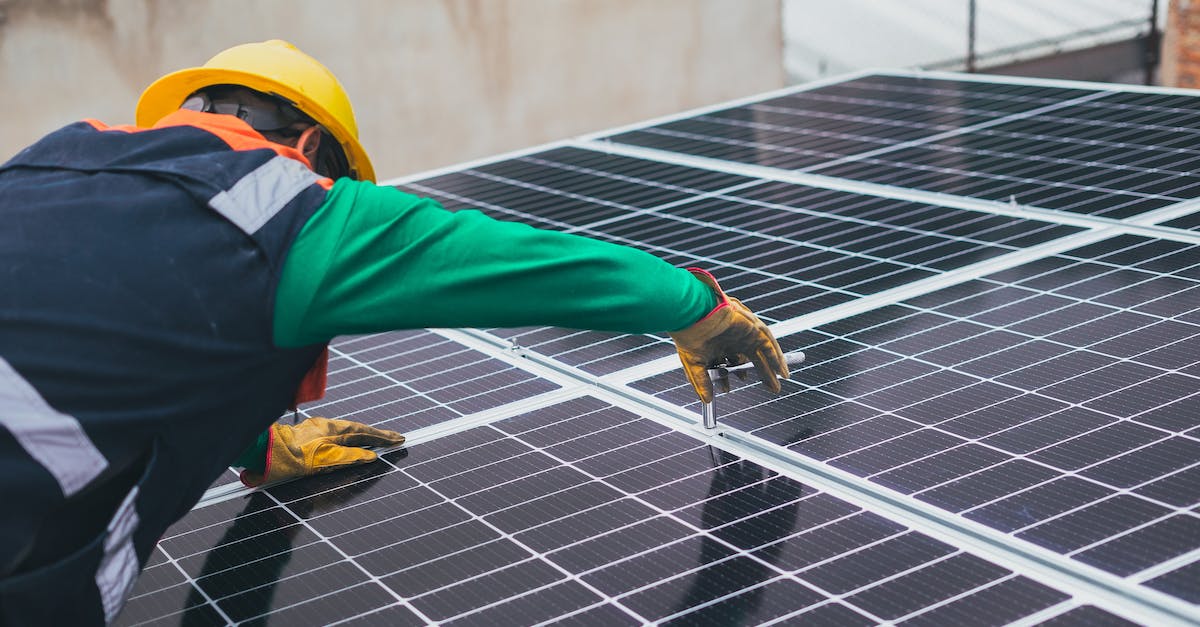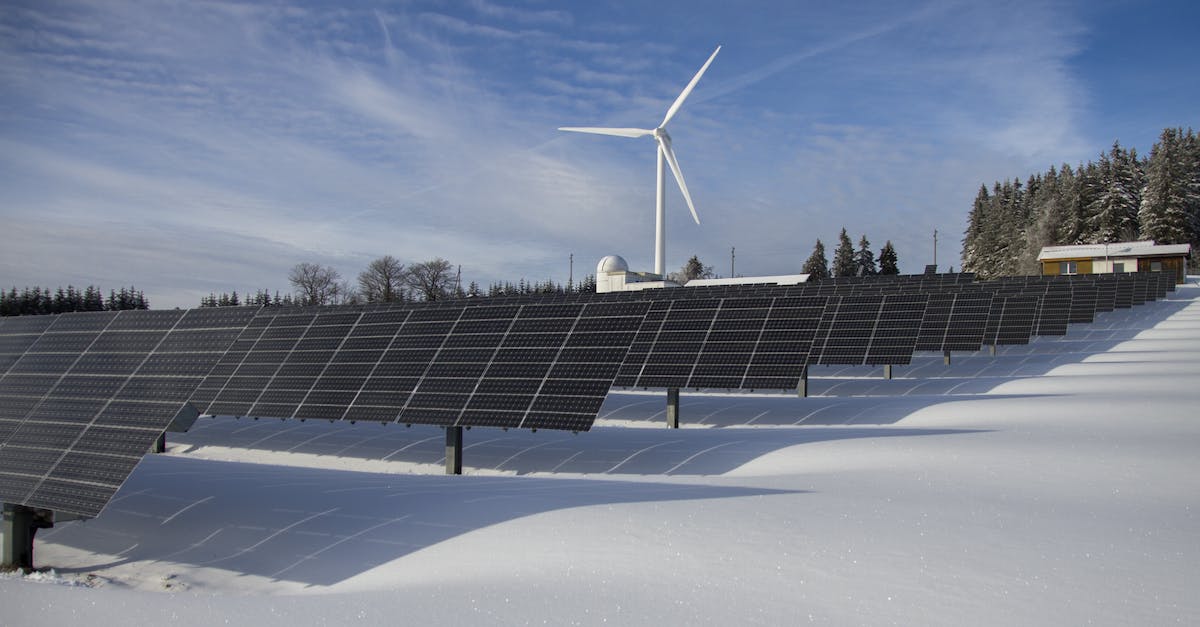Are you looking for a way to reduce your home’s carbon footprint and do your part to help protect the environment? Look no further than solar energy! It’s an easy, efficient, and effective way to reduce your carbon footprint and help make a difference in the world.
My family was one of the first in the neighborhood to install solar panels on our roofs. While it was a big financial commitment then, we’ve seen the rewards of going green over the years. Not only has our energy bill dropped significantly, but we’ve also enjoyed being part of something bigger. We’re helping the environment, but we’re also saving money in the process.
Solar energy is an excellent choice if you’re looking to reduce your home’s carbon footprint and make an impact. It’s a simple, straightforward way to reduce energy use and save money. Plus, installing solar panels on your roof is easier than ever. Companies like Sunrun and SunPower offer systems designed to make the installation process as easy as possible.
So, if you’re ready to become part of the solar energy revolution, now is the time to get started. Reduce your carbon footprint and help make a difference in the world. It’s never been easier to go green with solar energy!
What is Solar Energy?

.
Solar energy is the most abundant natural resource on our planet. It is the cleanest, most abundant, and most reliable form of renewable energy. Solar energy is sunlight that is converted directly into electricity and can be used to power homes, businesses, and even entire cities. Solar energy is renewable, meaning it will never run out or be depleted and produces no harmful emissions. It is also incredibly cost-effective, making it an ideal choice for reducing your home’s carbon footprint. So, how can you get started using solar energy to reduce your home’s carbon footprint? Let’s take a look!
Understand the Basics
First and foremost, it’s important to understand the basics of solar energy. Solar energy is produced when sunlight is converted into electricity by a solar panel. The electricity is then used to power your home and its appliances. Solar energy is a great way to reduce your home’s carbon footprint, as it does not produce any emissions.
Inspect Your Home
Once you understand the basics of solar energy, you should inspect your home to assess if it is suitable for solar panels. Factors such as roof size, angle, and exposure to sunlight will determine the efficiency of solar panels. Additionally, you must ensure that your home has enough space to accommodate the solar panels.
-

Fashionably Green and On-The-Go
£16.50 Select options This product has multiple variants. The options may be chosen on the product page -

Reusable and Ready Eco-Friendly Tote Bag
£16.50 Add to cart
Research Solar Installers
Once you have determined that your home is suitable for solar panels, you should research solar installers. Look for installers with a good reputation and experience in the industry. Get quotes from multiple installers and compare the prices and services they offer.
Purchase and Install the Solar Panels
Once you have chosen the right solar installer, you can purchase and install solar panels. The solar installer will help you in selecting the right type of solar panel and will also help in the installation process.
Enjoy the Benefits
Once the solar panels are installed, you will be able to enjoy the benefits of solar energy. Solar energy is free and renewable, so you will be able to save money on your electricity bills. Additionally, you will be reducing your home’s carbon footprint, which is great for the environment!
Using solar energy is a great way to reduce your home’s carbon footprint. From understanding the basics of solar energy to researching solar installers and purchasing and installing solar panels, there are many steps you can take to get started. So what are you waiting for? Start reducing your home’s carbon footprint today!
Advantages of Solar Energy

There are so many advantages of solar energy it’s hard to know where to start! But let’s give it a go…
- You’ll Save Money – Not only will you reduce your carbon footprint, but you’ll also save money! Solar energy is free, so you won’t be paying for fuel or electricity. Plus, governments worldwide offer solar energy incentives, so you’ll be able to save even more!
- It’s Good for the Environment – Solar energy is a renewable resource, so using it won’t deplete the earth’s resources. Plus, it won’t release any nasty emissions into the atmosphere, so you can rest assured that you’re doing your part for the planet.
- It’s Durable and Reliable – Solar energy systems are incredibly durable and can last for up to 25 years. They’re reliable and can provide electricity even when the sun isn’t shining.
- It’s Easy to Install – Solar energy systems are easy to install and don’t require any major changes to your home. Plus, you won’t have to worry about any complicated wiring or plumbing – it’s a breeze!
- So, if you’re looking to reduce your home’s carbon footprint, solar energy is definitely a great option. You’ll save money, help the environment, and rest easy knowing that you’re doing your part.
Disadvantages of Solar Energy

Although solar energy has many advantages, there are some drawbacks to be aware of. First, it can be incredibly costly to install. Although the initial investment may be expensive, the long-term rewards are worth it.
Second, solar energy is not always reliable. For example, in areas with overcast skies, solar panels may not be able to produce enough energy. Finally, solar panels can take up a lot of space. To get the most out of your system, you’ll need to find a way to maximize their surface area.
How Solar Energy Can Help Reduce Your Home’s Carbon Footprint

Ready to reduce your home’s carbon footprint and make the world greener? Solar energy is the way to go! It’s a reliable, renewable energy source that requires minimal maintenance and has long-term environmental benefits. Here’s how solar energy can help reduce your carbon footprint:
- Lower Energy Bills With solar energy, you can produce your own electricity, so you won’t have to rely on your utility company. This can result in significant savings on your monthly energy bills.
- Reduce Pollution Solar energy is a clean, renewable energy source that won’t pollute the environment. It doesn’t produce any hazardous emissions and helps reduce the number of greenhouse gases produced.
- Long-Term Savings Solar energy systems are a long-term investment that can save you money in the long run. With no fuel costs and minimal maintenance, you’ll be able to save money on your energy bills for years to come.
- Increase Home Value Installing a solar energy system can also increase the value of your home, as potential buyers are often looking for homes with energy-efficient features.
Solar energy is an excellent way to reduce your home’s carbon footprint and make the world a greener place. So, what are you waiting for? Get started today and start saving!
Installing Solar Panels

Ready to take your home’s carbon footprint to the next level? Installing solar panels is the way to go! It may seem overwhelming at first, but getting solar panels in your home can be a breeze with little research and planning.
- Assess Your Home – First, determine if your home is suitable for solar panel installation. Find out if your roof is in good condition and if it gets enough sunlight. You’ll also want to ensure no trees or other obstacles could prevent sunlight from hitting your panels.
- Research Your Options – Once you’ve determined that your home is suitable for solar panels, it’s time to do some research. Look into different solar panel types and decide which is best for your home. Also, research various installation companies to find one that meets your needs.
- Get Permits and Approvals – You must get the necessary permits and approvals from the local government before installing your solar panels. This can take some time, so factor this into your timeline.
- Install the Panels – Now it’s time to install the panels. Make sure you hire a professional to do this job, as it’s important to get it done properly.
- Enjoy the Benefits – Once your solar panels are installed, you’ll enjoy using clean, renewable energy. Not only will you be reducing your carbon footprint, but you’ll also be saving money on your energy bills in the long run.
Solar Energy Costs and Incentives

You may be wondering how much solar energy will cost you and what incentives are available to help you reduce your carbon footprint. Well, the good news is that there are plenty of incentives and cost savings available to make the transition to solar energy easier.
Start with Tax Credits
• Check out federal and state tax credits for solar energy.
• Many states offer additional credits for solar energy installations.
• Research local utility companies for additional credits and savings.
Look into Solar Leasing and Financing Options
• Solar leasing allows you to pay a fixed rate for the energy produced by your solar panels while the leasing company takes care of the installation and maintenance.
• Solar financing allows you to pay for the solar energy system over time, often with a low-interest loan.
Check Out Rebates
• Many states and utility companies offer rebates for solar energy systems.
• Do your research to see what’s available in your area.
Research State and Local Incentives
• Some states offer incentives to encourage the use of renewable energy.
• Check with your state and local government to see what incentives are available.
Solar energy is a great way to reduce your home’s carbon footprint and save money in the long run. With the help of tax credits, leasing and financing options, rebates and other incentives, you can make the transition to solar energy easier and more affordable.
Alternative Ways to Reduce Your Home’s Carbon Footprint

Do you want to reduce your home’s carbon footprint but you’re not sure where to start? There are a whole host of alternatives out there that don’t involve the expensive installation of solar panels. Here are some ideas to get you going:
- Invest in energy efficient appliances. This might seem like a big investment up front, but in the long run it can save you a lot of money in energy bills. Energy efficient appliances use less power to run, so they are cheaper to operate and are much better for the environment.
- Switch to LED lights. Switching to LED lights in your home can reduce your electricity bill by up to 80%. LED lights are much more efficient than traditional bulbs, so they use less energy and last a lot longer.
- Unplug devices when not in use. If you have a lot of electronics plugged in at home, it can add up to a lot of energy being wasted. Unplugging devices when you’re not using them can help to reduce your electricity bill and your home’s carbon footprint.
- Air dry your laundry. Instead of using a tumble dryer, hang your clothes outside to dry. This can save a lot of energy, and it’s a great way to get some fresh air and sunshine.
- Take shorter showers. Taking shorter showers uses less water, and it can help you to save on energy costs. Plus, it’s a great way to get your day started!
- Plant a garden. Planting a garden can help to absorb carbon dioxide, and it can also provide you with some delicious fruits and vegetables. Plus, it’s a great way to get some exercise.
- Ride your bike or walk. Whenever you can, try to ride your bike or walk to where you need to go instead of driving. Not only will it help to reduce your home’s carbon footprint, but it’s great exercise too!
Reducing your home’s carbon footprint doesn’t have to be expensive or difficult. With a few simple changes, you can make a big difference.
Benefits of Reducing Your Home’s Carbon Footprint

Have you ever wanted to do your part in protecting the environment? Then reducing your home’s carbon footprint is a great place to start. Here are 8 benefits of reducing your home’s carbon footprint:
- You’ll save money. You can save money on your energy bills by using solar energy. Plus, you won’t have to worry about the increasing cost of electricity.
- You’ll reduce your carbon footprint. By using solar energy, you’ll be helping to reduce your home’s carbon footprint. This means you’ll be doing your part in helping to protect the environment.
- You’ll be helping to create jobs. The solar energy industry is creating jobs all around the world. By using solar energy, you’ll be helping to create more jobs in the green energy sector.
- You’ll be helping to reduce air pollution. Solar energy does not produce air pollution, so by using solar energy, you’ll be helping to reduce air pollution.
- You’ll be helping to reduce water pollution. Solar energy does not require water to generate electricity, so by using solar energy, you’ll be helping to reduce water pollution.
- You’ll be helping to reduce global warming. Solar energy does not produce greenhouse gases, so by using solar energy, you’ll be helping to reduce global warming.
- You’ll be helping to conserve resources. Solar energy does not require the use of natural resources such as coal or oil, so by using solar energy, you’ll be helping to conserve these resources.
- You’ll be helping to improve public health. Solar energy does not produce harmful byproducts, so by using solar energy, you’ll be helping to improve public health.
Reducing your home’s carbon footprint is a great way to do your part in protecting the environment. So why not give it a try?
Conclusion
Solar energy is an incredible way to reduce your home’s carbon footprint and positively impact the environment. Solar energy is an incredible way to make a lasting change from powering your home to offsetting energy costs. With the right equipment, you can make an immediate difference in your energy consumption and carbon emissions. Best of all, solar energy is an affordable and reliable way to reduce your carbon footprint.
So, why not use the sun’s energy and reduce your home’s carbon footprint today? You’ll be amazed at how much of a difference solar energy can make to your home and the environment.

